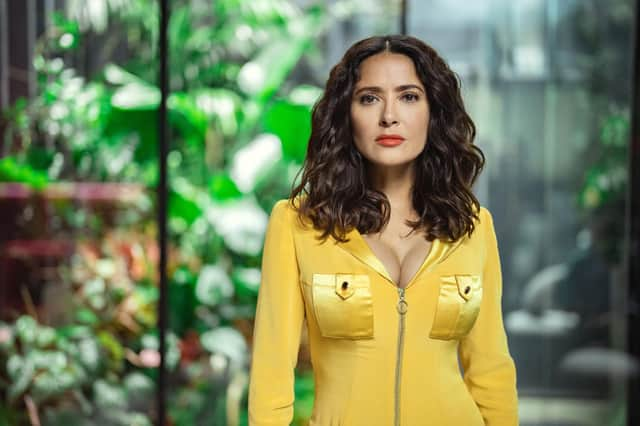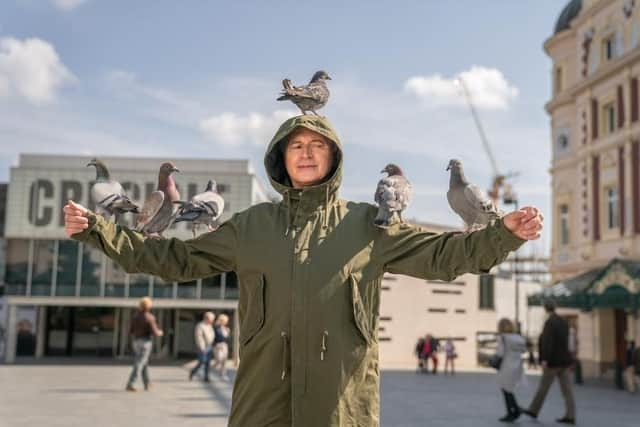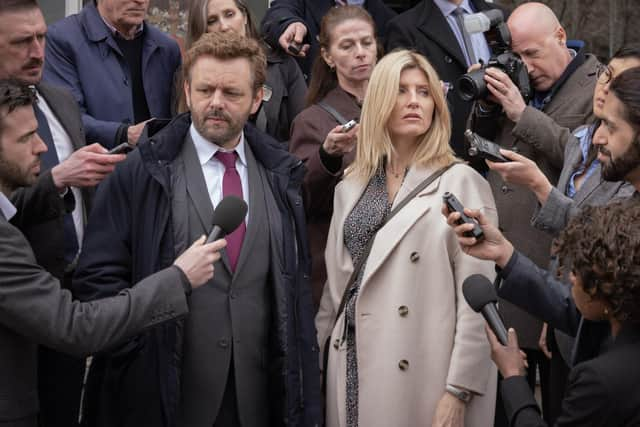TV review: The moral of Charlie Brooker's Black Mirror is as ever: be afraid, be very afraid


The warning came from Matt Clifford, the prime minister’s adviser on the robot domination threat. If development is unchecked, he said, we could “effectively create a new species [with] an intelligence that is greater than humans”.
Well, the future is already here. Or at least it’s playing out in the new series of Black Mirror (Netflix), from the diabolically dystopian mind of Charlie Brooker. In the episode Joan is Awful, a woman goes from sacking a colleague at work to a therapy session - “I feel like I’m not the main character in my life story,” she says prophetically - to a sneaky bar rendezous with her ex-boyfriend (exciting but unreliable). Then she heads home to her fiance (nice if “vanilla”), eats the bland dinner he’s cooked, turns on the TV … and to her horror watches a re-run of her day starring Salma Hayek.
Advertisement
Hide AdEvery moment has been exaggerated and that bit more brutal. In the next instalment - viewed by the entire office and indeed the whole world - the fiance gets up and leaves. Joan’s life is a show now, so why doesn’t she just shut the door, hide under the covers and wait for the ratings to plummet? No, Brooker wants to have even more ghastly fun, so he has her go round to the ex’s hotel, only awareness of the cameras affects his performance (“I’m going to be known as the guy who couldn’t get it up for Salma Hayek”). Then she bursts into a church where there’s a wedding in progress and something really disgusting happens.


“This is f****** insane!” screams Joan. And indeed it is. For Hayek isn’t just playing Joan but also Hayek or another version, generated by “super-advanced deep fake quantum computer mumbo-jumbo”. So after having to mimic Joan’s disgusting church thing she complains to her lawyer who tells her that complete portrayal is in the contract. “You know I don’t read that s***!” she hissyfits. “I’m a dyslexic, talented actress with questionable English. That’s why I overpaid you to protect me!”
And when Joan complains to her lawyer she learns that when she clicked “Accept” on the streaming service’s terms and conditions page she was in effect signing her consent to be exploited.
The network is called Streamberry with a similar logo and “da-dum” intro as Netflix so fair play to the latter for being part of Brooker’s grim joke. Joan is played by Annie Murphy who was Alexis in Schitt’s Creek. Murphy has her character wiggle and drum with her hands, like the dippy princess did in every edition of that giant lockdown smash, and I’m disappointed. Doesn’t she have any other moves? Ah, but there’s a twist which explains this. The moral of the tale: be careful with those “cookies”. Question more. Acknowledge that not all progress is good. But ultimately, be afraid, very afraid. And, well, if your tiny dramas do end up on screen, accept that you probably won’t have the consolation of being played by Salma Hayek in a tight yellow jumpsuit.
In 1999 a British Film Institute poll of our 100 best films of the century placed The Full Monty 25th. That was behind Trainspotting, Kes, The 39 Steps and The Third Man which won, but ahead of Life of Brian, Gregory’s Girl and Brassed Off, the contemporaneous grim-oop-north comedy with the cheering finale - plus, right down almost at the bottom, Carry On Up the Khyber.


How’s it aged? I haven’t seen The Full Monty since its release in 1997 and wouldn’t have put it so high, being a simple tale, modestly filmed. It might have benefited from being fresh in the minds of the voters, with the big reveal uppermost.
Advertisement
Hide AdAnyway, here’s the Disney+ sequel, catching up with Robert Carlyle’s Gaz and most of the other unemployed Sheffield steelworkers who rather than sit on their backsides moping, decided to expose them.
Why revisit? The opening captions explain how in the intervening years there have been seven prime ministers and eight northern regeneration policies but little has changed. Indeed, for our gang, it’s got worse.
Advertisement
Hide AdGaz - squinting from behind curtains of grey hair, his gold earring barely twinkling - is living in a caravan and can’t find the money for a souped-up wheelchair for his grandson. Horse (Paul Barber), who rides a mobility scooter, is living off tinned spuds. Dave (Mark Addy) is caretaker at a dilapidated state school. And Dennis (Paul Clayton) and Lomper (Steve Huison) run a roll shop called Big Baps which is soon forced to undergo a name-change.
“The snowflakes have taken over the asylum,” moans Dennis. “First, the political correctness Nazis come for our Pirelli calendars. Then our innocent double entendres. And finally our caff.”
These guys are confused, disappointed and intimidated by the modern world. I get this, sympathise and, once or twice in the opening episode, laugh along (this is The Half-Full Monty, maybe not even that). But how is the theme going to sustain them, and us, over another seven hours? How are they going to fight back, regain self-esteem and, while they despair about automated checkouts at the supermarket, prove they’re still a long way from checking out themselves? Surely - with Uncle Walt Disney looking down - they’re not about to bare all?
Sorry, another question: what’s the railtrack equivalent of the mile-high club? I’m pondering this at the very beginning of Best Interests (BBC1) as Sharon Horgan drags Michael Sheen into their train loo. It’s a sweet, funny scene telling us that here’s a married couple, Nicci and Andrew, who don’t get out much but have had fun on this trip, remembering who they used to be, pre-kids and all that worry.
They worry most about Marnie who has muscular dystrophy. Then, at 13, she suffers a heart attack and probably now brain damage too. The hospital questions her quality of life; Nicci cherishes every tiny twitch of her daughter’s hand which the docs suspect are involuntary reactions. The hospital wants to withdraw life support; she’s going to fight it.
Is Andrew with her? Nicci says: “I believe she has moments of great happiness - do you?” He says: I love her too.” Jack Thorne’s drama is about medical ethics, end-of-life care and whether crippling costs are influencing decisions to turn off machines like Marnie’s ventilator. But it’s also concerned with the effect all of this has on the rest of the family and, in a heart-shattering way, how a previously tight unit can unravel itself.
Advertisement
Hide AdThere’s another daughter who, inevitably, gets neglected while her emotionally-frazzled parents argue over the best thing to do. Nicci recruits a pro-life group while Andrew, by Marnie’s bedside, sings the Stone Roses (“Your star will shine again one day … ”) and reads from Adrian Mole. Thorne is careful to alight on Sue Townsend’s description of Margaret Thatcher (“Eyes like a psychotic killer, but the voice of a gentle person”) while director Michael Keillor is careful to show the bloody great electricity pylon outside the family’s home. These are ordinary people and this is an extraordinary piece of work.
Comments
Want to join the conversation? Please or to comment on this article.